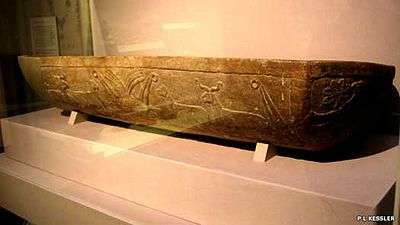Uruk Trough
|
The Uruk Trough as displayed in the British Museum | |
| Material | Gypsum |
|---|---|
| Size | 96.5 cm long |
| Created | 3300-3000 BC |
| Present location | British Museum, London |
| Registration | 1928,0714.1 |
Along with the Uruk Vase, the trough is considered to be one of the earliest surviving works of narrative relief sculpture from the Middle East.
History and discovery
The trough was found at Uruk, an ancient city of Sumer and later Babylonia situated east of the Euphrates in southern Iraq. During the prehistoric period (3300–3000 BC) Uruk was one of the largest cities in southern Mesopotamia, stretching over an area of 5 square kilometres (1.9 sq mi). For a long time power seems to have been concentrated in the temples or religious organisations but eventually King Gilgamesh took over, building new structures and a massive city wall. The Uruk Trough was probably a venerated object in one of the temples in the city, perhaps devoted to the deity Inanna. The circumstances of its discovery are not known. The trough was purchased by the British Museum with the support of the National Art Collections Fund in 1928, just before the German Oriental Society carried out excavations at the site.
Description
The Uruk Trough is made of gypsum and is approximately one metre long. A fragment of one end of the object is now in the Vorderasiatisches Museum in Berlin. Although called a 'trough' it is unlikely that it was used as such, as the decoration would have not been visible to viewers. It is more likely it was used as some sort of cult image, perhaps in the temple of Inanna, the principle goddess in ancient Mesopotamia at this time. The carving shows a procession of rams, ewes and lambs approaching or emerging from a reed building, similar one lived in by the Marsh Arabs in southern Iraq. Experts have so far not been able to explain what the scenes mean, although the reed bundles on the building have been used subsequently as symbols of the goddess Inanna and the carvings may relate to the fecundity of the land under Inanna's protection.
See also
- Uruk Vase for a contemporary object decorated in a similar style
References
Further reading
- D. Collon, Ancient Near Eastern art (London, The British Museum Press, 1995)
- J. Black and A. Green, Gods, demons and symbols of ancient mesopotamia (London, The British Museum Press, 1992)
- H.W.F. Saggs, Babylonians (London, The British Museum Press, 1995)
- P.P. Delougaz, 'Animals emerging from a hut', Journal of Near Eastern Studies-1, 27 (1968), pp. 186–7
